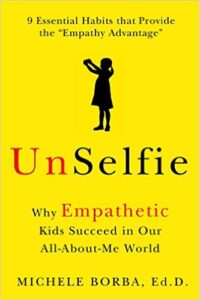In my last post (3 Skills That Teach Resourcefulness) I described three skills (brainstorming, self-reliance, and decision making) that help kids become resourceful and resilient. Here are three more essential and teachable skills (how to negotiate resist peer pressure, and bounce back from failure) in this special two-part series aimed at helping our children and teens become independent, self-reliant, resourceful and resilient.
Skill #4. Show how to negotiate
 It’s a typical Saturday morning with another sibling battle. Today’s war: which of your two kids, ages 4 and 6, gets to choose the TV show. As usual, your kids expect you to be the negotiator.
It’s a typical Saturday morning with another sibling battle. Today’s war: which of your two kids, ages 4 and 6, gets to choose the TV show. As usual, your kids expect you to be the negotiator.
Wrong move if you want your kids to be able to solve their own battles. After all, a big part of becoming independent is learning how to deal when disagreements with others arise.
Your new tactic: Teach your kids how to negotiate so when the next war breaks out you can tell your darling cherubs to work it out on their own. Just imagine: peace on the home front.
A few ways to get your kids started:
Your first step is to cool the kiddies down. “
You can’t work things out if you’re upset. Walk away from each other until you’re calm.” Then explain the new skill: “You need to learn to negotiate. That’s when you agree to work out a deal so you’re both are happy.”
Next, teach your kids a few old but good ‘deal breakers’ such as “rock, paper, scissors”, drawing straws, flipping a coin, or the rule: “Who went first last time, goes last this time.” Oven timers are also great for reducing squabbles. Just show your kids how to set it, and it can be a great sanity saver. “I’m setting the timer for five minutes, but when it goes off it’s my turn to play.”
Don’t forget to set clear ‘negotiation behavior’: “You must take turns listening to each other. And there is no interrupting, and no put-downs. Only calm voices are allowed.” If needed, be sure to make one more rule: “No TV for the day if you two can’t work this out peacefully.”
That one can produce amazing results!
Skill #5. Teach how to resist peer pressure and not conform
Your 10-year-old begs that she ‘has to have’ pricey new sneakers. “All the really ‘cool’ girls wear them,” she says, “and their moms let them, so why won’t you?”
Now don’t get me wrong, ‘fitting in’ is important, and peer pressure isn’t always bad. In fact, at times it can be positive (like when his friend frowns on your child’s bad grade, encourages him to try a healthy activity, or even urges him to get his act together). But let’s be honest: what we worry about is whether our kids can buck those negative peer temptations. Sure, those pressures can be fierce, but even so, independent kids can resist the “gotta have it/do it” urge. A big part of why they can is because they’ve learned to make choices based on reason instead of fearing friends’ disapproval. Independent kids also know how to weigh which of their friend’s requests really should be fulfilled and which go against their moral compass. So if you’ve noticed your kid is easily swayed by the pack (and you’re feeling like an ATM machine lately), try these ideas.
1. First, help your child recognize if his buying desire is based on personal need or pack approval. Ask: “What about those expensive jeans you had to have three weeks ago because your friends have them? How often do you wear them? Are you still glad you bought them?” Of course, your child may say “yes”, but you just might have caused him to question the “worth it” factor.
2. If your child is spending a lot of time to try to be or look like others, set a clothes allowance. Doing so helps her decide how much she really wants to spend to “fit in.” How your kid chooses to spend her money is her choice, but no loans/advances. “Sorry, you agreed on the amount and you spent it. Monday is allowance day.”
3. Require a few days of “wait time” before allowing an impulse purchase. Tell her, “If it’s really important you’ll want it just as much tomorrow (or next week), so sleep on it and then we’ll decide.” This gives your kid time to think how much he wants the item and may discover it’s not so essential.
4. Don’t be afraid to say “no.” Just state your reason so your kid understands it: “I know that Kelly has her belly pierced, but our family has different rules.” or “You might get an infection and we made a pact: “No piercings until you’re 18.” Then stand firm. Believe me, Mom, your kid really will survive.
Skill 6. Teach how to bounce back from failure and try again
Your 11-year-old runs in sobbing that she didn’t make the volleyball team. “I’m never going to try out for any team again,” she cries. “The girls think I’m the biggest nerd.”
Sharon, a 32-year old mom, sought my advice on this very problem. “My daughter was shattered about not being selected. Is there anything I can do to help her bounce back?”
The truth is, you can’t protect kids from failing, but helping your child learn how to cope with defeat is a big part of nurturing independence. How else will your child be eager to handle life’s inevitable setbacks without you? It’s obvious that he can’t always depend on you whenever he errs or things get tough. But there are simple ways to gently use your child’s failures to help him learn rebound skills that will boost his independence aptitude. Here are a few ideas Sharon used to help her daughter bounce back.
Sharon did acknowledge her daughter’s hurt feelings: “I know how upset you are. Losing is never easy, especially in front of your friends.” But she also wanted her daughter to recognize that failure isn’t fatal. So she taught Julie to say a positive statement to herself such as: “Nobody’s perfect” or “Everyone makes mistakes” whenever she failed. She helped her daughter practice it so she’d use it when mom wasn’t there.
Julie’s mom realized that her daughter (like many kids) was reluctant to try-out again fearing she’d only have another failing experience. So Sharon’s next step was to help daughter understand that mistakes don’t have to be “deadly”. Mom began by making mistakes be OK in their household and reminded Julie: “Mistakes are how we all learn.”
She even shared her own mistakes and as well as how she corrected them. “What a flop! Next time I’ll read the whole recipe before adding the eggs.” Doing so will help your child recognize not only that everyone makes mistakes (including you!), but that they can also be learning opportunities in disguise. And that’s a big plus to your kid’s independence because she’ll be less likely to fear the mistake and more likely to rebound.
Sharon also taught her daughter things to say to handle defeat gracefully in front of friends and ease those awkward moments. “The tryouts were tough, but the judging seemed fair.” Or “I just didn’t make the cut-you win some, you lose some.” She then helped her practice the lines until she could confidently say them to peers.
Of course all kids are bound to fail now and then, but a big secret to whether they bounce back is knowing how to cope with the defeat. After all, mistakes happen to everyone, so learning to deal with them is just one more skill your child needs to handle life successfully on her own.
Remember, character is a trait that be nurtured and is made up of crucial skills that can all be taught. These three skills not only will help your child be more resourceful and self-reliant, but also more success and resilient in handling every arena of his or her life. It’s all part of helping our kids grow to become capable, strong and responsible human beings!
Best!
Michele
Dr. Michele Borba, Parenting Expert
 I am an educational psychologist, parenting expert, TODAY show contributor and author of 22 books including The Big Book of Parenting Solutions: 101 Answers to Your Everyday Challenges and Wildest Worries.
I am an educational psychologist, parenting expert, TODAY show contributor and author of 22 books including The Big Book of Parenting Solutions: 101 Answers to Your Everyday Challenges and Wildest Worries.
You can also refer to my blog, Dr. Borba’s Reality Check for ongoing parenting solutions and late-breaking news and research about child development.
My new book, UNSELFIE: Why Empathetic Kids Succeed in Our All-About-Me World will be in print June 2016. (Yahoo!) I’ve spent the last five years researching and writing this book as well as literally flying around the world to find the best ways we can activate our children’s hearts. My goal is to create a conversation that makes us rethink or view of success as exclusively grades, rank and score and includes traits of humanity! It’s filled with common-sense solutions based on the latest science to help us raise compassionate, caring, courageous kids. It’s time to include “empathy” in our parenting and teaching!
Follow me on twitter @MicheleBorba

